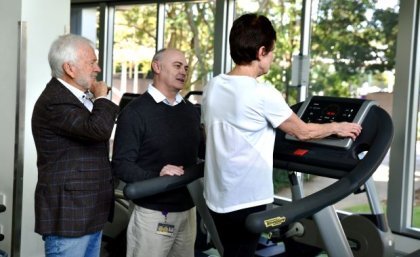A groundbreaking study from the University of Queensland reveals that short bursts of intense exercise can significantly improve brain function in older adults, with benefits lasting up to five years. This research offers new hope for maintaining cognitive health well into our golden years.
The study, led by Emeritus Professor Perry Bartlett and Dr. Daniel Blackmore from UQ’s Queensland Brain Institute, involved healthy volunteers aged 65 to 85. Participants engaged in a six-month exercise program, underwent cognitive testing, and received high-resolution brain scans.
“Six months of high-intensity interval training is enough to flick the switch,” Emeritus Professor Bartlett said. He added, “In earlier pre-clinical work, we discovered exercise can activate stem cells and increase the production of neurons in the hippocampus, improving cognition.”
Remarkably, even five years after the program ended, participants still showed improved cognitive function, regardless of whether they had maintained their exercise routines.
Not All Exercise Created Equal for Brain Health
The researchers compared three exercise intensities: low (focusing on balance and stretching), medium (brisk walking), and high (near-maximum exertion on a treadmill). Only the high-intensity interval training led to long-lasting cognitive improvements.
Dr. Blackmore explained, “On high-resolution MRI scans of that group, we saw structural and connectivity changes in the hippocampus, the area responsible for learning and memory. We also found blood biomarkers that changed in correlation to improvements in cognition.”
This discovery could have far-reaching implications for combating dementia, a condition affecting nearly half a million Australians. With one in three people aged 85 likely to develop dementia, finding effective preventive measures is crucial.
“If we can change the trajectory of ageing and keep people cognitively healthier for longer with a simple intervention like exercise, we can potentially save our community from the enormous personal, economic and social costs associated with dementia,” Emeritus Professor Bartlett emphasized.
The study, published in Aging and Disease, opens new avenues for research. The team is now investigating genetic factors that may influence an individual’s response to exercise and exploring the potential use of biomarkers as diagnostic tools for exercise effectiveness.
As the global population ages, these findings offer a promising, accessible strategy for maintaining brain health. While more research is needed to refine exercise guidelines for older adults, this study suggests that incorporating short, intense workouts could be a powerful tool in the fight against cognitive decline.


